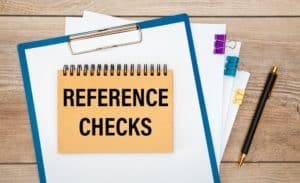
Unfortunately, candidates are not always truthful on resumes. In fact, more than half of employers (56%) have discovered a lie on a resume. Whether the mistruth is an exaggeration or a complete fabrication, some candidates are not above fibbing to better their chances at securing a position. It’s not uncommon to uncover lies about education, job titles, or dates of employment, or instances of stretching the truth to pump up one’s skill set or responsibilities from past work experience.
Diligence in performing reference checks—even when the candidate appears to be a perfect fit—is a crucial step in protecting your company and your current workforce from a bad hire. By utilizing a series of insightful, open-ended questions, an employer can validate information included on a resume and learn about characteristics such as work ethic, attitude, dependability, and relationships with co-workers.
The “when” and “how” of checking references
His resume piqued your interest. The interview confirmed he falls into the “has definite potential” category. Now, before scheduling a second interview or extending an offer of employment, it’s time to check references. To gain further insight, confirm what the candidate shared via his resume and conversation and determine if the vibes you’re getting can be backed up with solid evidence. A pursuit that requires asking the right questions –in the right way.
- Avoid questions that can be answered with a “yes” or “no.”
- Steer clear of leading questions that “point” toward an expected answer.
- Review employment history concerning dates, positions/titles held, and job responsibilities for accuracy.
Strive to ask questions about specific traits or qualities that invite the responder to share scenarios that validate generic statements often found on a resume.
- “Tell me about a time when XX worked well on a team.”
- “Please share an example of XX’s organizational abilities.”
- “How would you describe what it was like to work with XX?”
- “How would you describe XX’s aptitude for communication?”
- “What qualities did XX bring to the realm of co-worker relationships?”
- “Can you describe a scenario when XX demonstrated the ability to follow directions? To give direction to others?”
Knowing what not to ask in a reference check is just as critical. Simply put, questions must pertain to the job and the candidate’s qualifications. Avoid any questions about the candidate’s personal life, as these types of questions can subject your company to discrimination claims. For instance, do not inquire about—
- Personal/demographic information: This includes questions about sexuality, age, religion.
- Health: You may not ask about a candidate’s past or current health. But you are permitted to ask whether the candidate will be able to perform the tasks that the job requires.
- Credit scores: While you can request a credit score from a job applicant, you may not ask a reference about an applicant’s credit score.
- Family matters: Avoid questions that seek information about a potential or current spouse, as well as children or the plan to have children. You may ask a reference if they feel the time demands of this job will suit the candidate.
At A.R. Mazzotta, we understand the need to vet candidates. That’s why we carefully interview talent using behavior-based methods and hard/soft skill assessments. We also do reference checks to validate skills and experience. Our goal for each day is to match your job positions with talented candidates perfectly. Connect with our team today.
